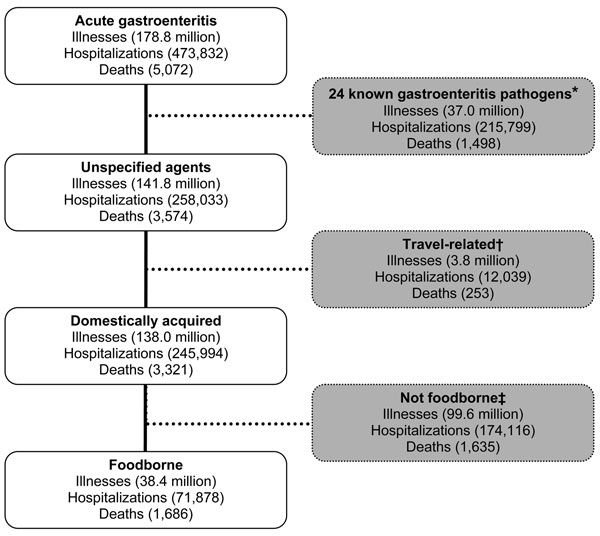Volume 17, Number 1—January 2011
Research
Foodborne Illness Acquired in the United States—Unspecified Agents
Figure 2

Figure 2. Schematic of estimates of illnesses, hospitalizations, and deaths caused by unspecified acute gastroenteritis agents. *The estimated numbers of illnesses, hospitalizations, and deaths (hereafter, illnesses refers to illnesses, hospitalizations, or deaths as appropriate) caused by the 24 known gastroenteritis pathogens (1) were subtracted to estimate the number of illnesses caused by unspecified agents. †The estimated numbers of illnesses related to travel were subtracted to estimate the number of domestically acquired illnesses. The estimates of the proportion related to travel were based on the overall weighted distribution of the proportions of illnesses that were related to travel from the 24 known gastroenteritis pathogens. ‡The estimated numbers of nonfoodborne illnesses were subtracted to estimate foodborne illnesses. The estimates of the proportion foodborne were based on the overall weighted distribution of the proportions of illnesses that were foodborne from the 24 known gastroenteritis pathogens. All estimates were based on US population in 2006.
References
- Scallan E, Hoekstra RM, Angulo FJ, Tauxe RV, Widdowson M-A, Roy SL, Foodborne illness acquired in the United States—major pathogens. Emerg Infect Dis. 2011;17:7–15.PubMedGoogle Scholar
- Songer JG, Trinh HT, Killgore GE, Thompson AD, McDonald LC, Limbago BM. Clostridium difficile in retail meat products, USA, 2007. Emerg Infect Dis. 2009;15:819–21. DOIPubMedGoogle Scholar
- Pereira KS, Schmidt FL, Guaraldo AM, Franco RM, Dias VL, Passos LA. Chagas’ disease as a foodborne illness. J Food Prot. 2009;72:441–6.PubMedGoogle Scholar
- Dekeyser P, Gossuin-Detrain M, Butzler JP, Sternon J. Acute enteritis due to related Vibrio: first positive stool cultures. J Infect Dis. 1972;125:390–2. DOIPubMedGoogle Scholar
- Riley LW, Remis RS, Helgerson SD, McGee HB, Wells JG, Davis BR, Hemorrhagic colitis associated with a rare Escherichia coli serotype. N Engl J Med. 1983;308:681–5. DOIPubMedGoogle Scholar
- Mintz E. A riddle wrapped in a mystery inside an enigma: Brainerd diarrhoea turns 20. Lancet. 2003;362:2037–8. DOIPubMedGoogle Scholar
- Hall JA, Goulding JS, Bean NH, Tauxe RV, Hedberg CW. Epidemiologic profiling: evaluating foodborne outbreaks for which no pathogen was isolated by routine laboratory testing: United States, 1982–9. Epidemiol Infect. 2001;127:381–7. DOIPubMedGoogle Scholar
- Tauxe RV. Emerging foodborne pathogens. Int J Food Microbiol. 2002;78:31–41. DOIPubMedGoogle Scholar
- US Census Bureau. Population estimates [cited 2010 Mar 9]. http://www.census.gov/popest/states/NST-ann-est.html
- Jones TF, McMillian MB, Scallan E, Frenzen PD, Cronquist AB, Thomas S, A population-based estimate of the substantial burden of diarrhoeal disease in the United States; FoodNet, 1996–2003. Epidemiol Infect. 2007;135:293–301. DOIPubMedGoogle Scholar
- Scallan E. Activities, achievements, and lessons learned during the first 10 years of the Foodborne Diseases Active Surveillance Network: 1996–2005. Clin Infect Dis. 2007;44:718–25. DOIPubMedGoogle Scholar
- Centers for Disease Control and Prevention. National Hospital Discharge Survey [cited 2010 Feb 2]. http://www.cdc.gov/nchs/nhds.htm
- Dennison C, Pokras R. Design and operation of the National Hospital Discharge Survey: 1988 redesign. Vital Health Stat 1. 2000;39:1–42.PubMedGoogle Scholar
- Healthcare Cost and Utilization Project. Overview of the Nationwide Inpatient Sample (NIS) [cited 2010 Feb 8]. http://www.hcup-us.ahrq.gov/nisoverview.jsp
- Centers for Disease Control and Prevention. Ambulatory health care data [cited 2010 Feb 8]. http://www.cdc.gov/nchs/ahcd/about_ahcd.htm
- Centers for Disease Control and Prevention. Mortality data, multiple cause-of-death public-use data files [cited 2010 Feb 8]. http://www.cdc.gov/nchs/products/elec_prods/subject/mortmcd.htm
- Heron M, Hoyert DL, Murphy SL, Xu J, Kochanek KD, Tejada-Vera B. Deaths: final data for 2006. Natl Vital Stat Rep. 2009;57:1–134.PubMedGoogle Scholar
- Vose D. Risk analysis. A quantitative guide. 2nd ed. Chichester (UK): John Wiley & Sons, Ltd; 2000.
- Mead PS, Slutsker L, Dietz V, McCaig LF, Bresee JS, Shapiro C, Food-related illness and death in the United States. Emerg Infect Dis. 1999;5:607–25. DOIPubMedGoogle Scholar
- Badger GF, Curtiss C, Dingle JH, Hodges RG, Jordan WS Jr, McCorkle LP. A study of illness in a group of Cleveland families. XI. The occurrence of gastrointestinal symptoms. Am J Hyg. 1956;64:349–56.PubMedGoogle Scholar
- Monto AS, Koopman JS. The Tecumseh study. XI. Occurrence of acute enteric illness in the community. Am J Epidemiol. 1980;112:323–33.PubMedGoogle Scholar
- Pinner RW, Teutsch SM, Simonsen L, Klug LA, Graber JM, Clarke MJ, Trends in infectious diseases mortality in the United States. JAMA. 1996;275:189–93. DOIPubMedGoogle Scholar
- Mounts AW, Holman RC, Clarke MJ, Bresee JS, Glass RI. Trends in hospitalizations associated with gastroenteritis among adults in the United States, 1979–1995. Epidemiol Infect. 1999;123:1–8. DOIPubMedGoogle Scholar
- Gangarosa RE, Glass RI, Lew JF, Boring JR. Hospitalizations involving gastroenteritis in the United States, 1985: the special burden of the disease among the elderly. Am J Epidemiol. 1992;135:281–90.PubMedGoogle Scholar
- Cantwell LB, Henao OL, Hoekstra RM, Scallan E. The effect of different recall periods on estimates of acute gastroenteritis in the United States, FoodNet Population Survey 2006–2007. Foodborne Pathog Dis. 2010;10:1225–8. DOIPubMedGoogle Scholar
- Simonsen J, Teunis P, Van Pelt W, Van Duynhoven Y, Krogfelt KA, Sadkowska-Todys M, Usefulness of seroconversion rates for comparing infection pressures between countries. Epidemiol Infect. 2010;12:1–8.PubMedGoogle Scholar
- Adak GK, Long SM, O'Brien SJ. Trends in indigenous foodborne disease and deaths, England and Wales: 1992 to 2000. Gut. 2002;51:832–41. DOIPubMedGoogle Scholar
- Hall G, Kirk MD, Becker N, Gregory JE, Unicomb L, Millard G, Estimating foodborne gastroenteritis, Australia. Emerg Infect Dis. 2005;11:1257–64.PubMedGoogle Scholar
- Centers for Disease Control and Prevention. Surveillance for foodborne disease outbreaks—United States, 2006. MMWR Morb Mortal Wkly Rep. 2009;58:609–15.PubMedGoogle Scholar
- Karmali MA, Petric M, Lim C, Fleming PC, Arbus GS, Lior H. The association between idiopathic hemolytic uremic syndrome and infection by verotoxin-producing Escherichia coli. J Infect Dis. 1985;151:775–82. DOIPubMedGoogle Scholar
1Current affiliation: Colorado School of Public Health, Aurora, Colorado, USA.